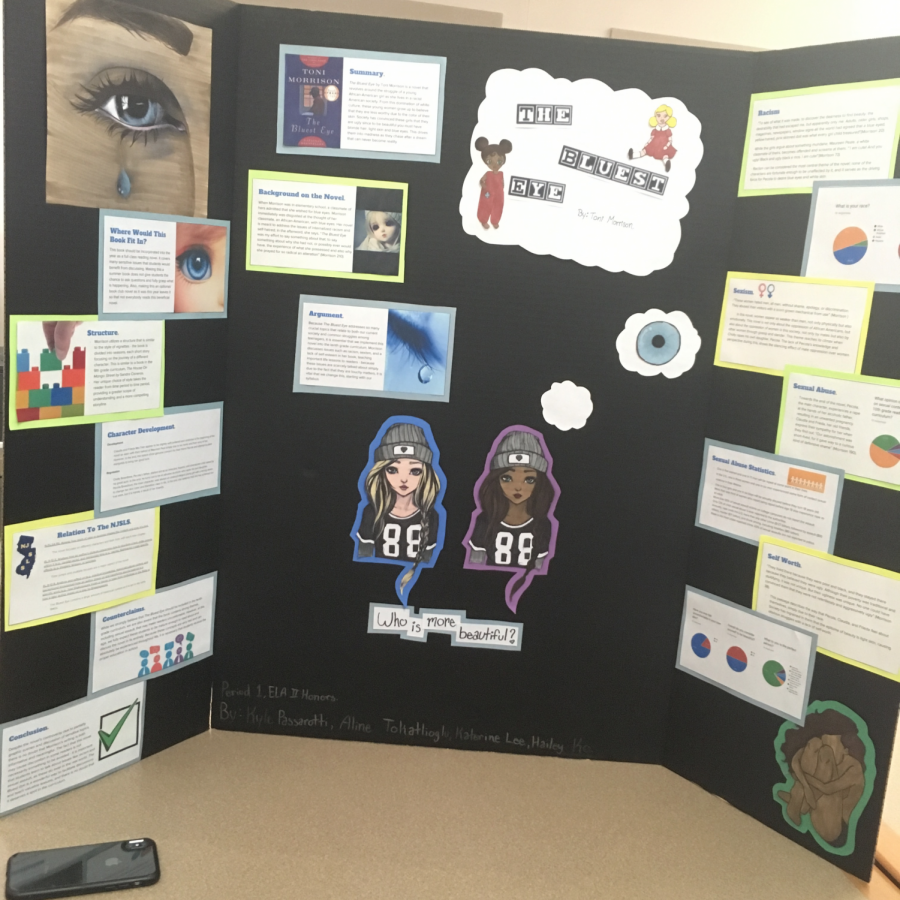American Literature Students Argue for Controversial Books
A project on The Bluest Eye by sophomores Kyle Passarotti, Aline Tokatlioglu, Katherine Lee and Hailey Ko.
January 29, 2019
On Friday, January 11, the sophomores in English II Honors gathered in the media center to present on some of teen literature’s most controversial books. This event is an American Lit tradition, introduced to CHS in 2015. The students’ goal was to convince the administration as to why their book should or should not stay in the curriculum, and, ultimately, to make a case for one book to be formally incorporated into the American Lit syllabus for next year’s crop of sophomores. This year, students had their choice of 4 books to advocate for — The Bluest Eye, The Joy Luck Club, Kindred, and The Namesake — all of which are written by authors of color, feature protagonists of color, and tackle the subject of racial and cultural identity.
Anna Sun, whose work centered on Amy Tan’s The Joy Luck Club, says it should stay in the curriculum for three reasons: cultural diversity, relatability, and NJSLS standards. “When we look into American literature, if you see the reading list for 10th grade American literature everything is all centered around white male characters. All the books written by white male authors. This is pretty much the only book that’s non-white and [written by] a female author so I think it’s really important for those reasons and offers some kind of diversity […] this introduces how modern America is like a melting pot for all different cultures.”
To Anna’s group, the most important aspect was relatability. Take her now-favorite quote of all time from The Joy Luck Club: “Well, I don’t know if it’s explicitly stated in the law, but you can’t ever tell a Chinese mother to shut up. You could be charged as an accessory to your own murder.” Anna continues, “It’s almost sarcastic in a sense. You can’t take it literally: you have to have a light sense of humor,” she said. “I got from this also knowing a little about Chinese culture is the Confucian belief of filial piety. It’s a big thing they play on this book: [that you] have to respect your elders, [which is] something [first-generation immigrants] emphasize and the second generation doesn’t as much… ask any Asian-American students in our school and they’ll say the same thing.”
Octavia E. Butler’s Kindred is about a black woman who time-travels back into slavery, where she is impelled to make many crucial decisions. Brandon Tilp believes that this book, though contentious, teaches an invaluable lesson in touching on the “dark history of America.” It’s that timeless warning of historic recurrence as, “if you don’t teach slavery,” Tilp says, “then slavery may repeat itself.”
Perhaps another compelling aspect of the project is that it pushes students to take up different perspectives — and sometimes ones at odds with those of their own peers. Another group argued that Kindred should not stay in the curriculum because it contains profanity and school-inappropriate themes.
Every year it gets better, says Mrs. Krapels, who oversees the project and makes necessary adjustments based on student feedback.
“This year, I extended the timeline a little bit because groups have asked me to do that in the past – in the end of the project I give a survey for everybody who did the project and ask what worked and what didn’t. And one thing that routinely comes up is that they want more time so this year I extended the timeline by 2 weeks. It gave us more time to put the rubric together as a class,” she said. The students create their own rubric for the project, allowing for self-determination and accountability.
“So I think this year is the best year it’s been. I anticipate that next year will be even better,” she said.
“The book that we added to the curriculum this year as a result of last year was In the Time of the Butterflies, which we added as a summer reading book, so I took out Flowers of Algernon.”
While Mrs. Krapels is undecided on what she will do this year, she acknowledges the arguments made for books.
“The groups for Kindred made a really good case for it. I haven’t done that as the whole class novel yet so I’m… interested in the idea of doing it because it hasn’t been done before. The Bluest Eye groups have also made a good case, and I have done that before so I know exactly how I want to do it again,” she contemplated.


